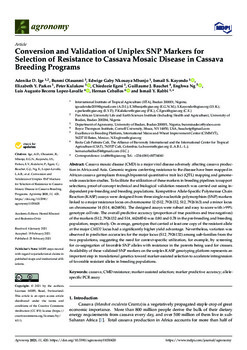Conversion and validation of uniplex SNP markers for selection of resistance to cassava mosaic disease in cassava breeding programs
Abstract
Cassava mosaic disease (CMD) is a major viral disease adversely affecting cassava production in Africa and Asia. Genomic regions conferring resistance to the disease have been mapped in African cassava germplasm through biparental quantitative trait loci (QTL) mapping and genome-wide association studies. To facilitate the utilization of these markers in breeding pipelines to support selections, proof-of-concept technical and biological validation research was carried out using independent pre-breeding and breeding populations. Kompetitive Allele-Specific Polymerase Chain Reaction (KASP) assays were designed from three single nucleotide polymorphism (SNP) markers linked to a major resistance locus on chromosome 12 (S12_7926132, S12_7926163) and a minor locus on chromosome 14 (S14_4626854). The designed assays were robust and easy to score with >99% genotype call rate. The overall predictive accuracy (proportion of true positives and true negatives) of the markers (S12_7926132 and S14_4626854) was 0.80 and 0.78 in the pre-breeding and breeding population, respectively. On average, genotypes that carried at least one copy of the resistant allele at the major CMD2 locus had a significantly higher yield advantage. Nevertheless, variation was observed in prediction accuracies for the major locus (S12_7926132) among sub-families from the two populations, suggesting the need for context-specific utilization, for example, by screening for co-segregation of favorable SNP alleles with resistance in the parents being used for crosses. Availability of these validated SNP markers on the uniplex KASP genotyping platform represents an important step in translational genetics toward marker-assisted selection to accelerate introgression of favorable resistant alleles in breeding populations.

